With Umeed, women from Hyderabad see empowerment with finding confidence and a livelihood
In 2015, the NGO Umeed was started by Gauri Mahendra and Udita Chadha in Hyderabad to promote women’s empowerment by providing training to them to create and sell simple and beautiful eco-friendly handicrafts.
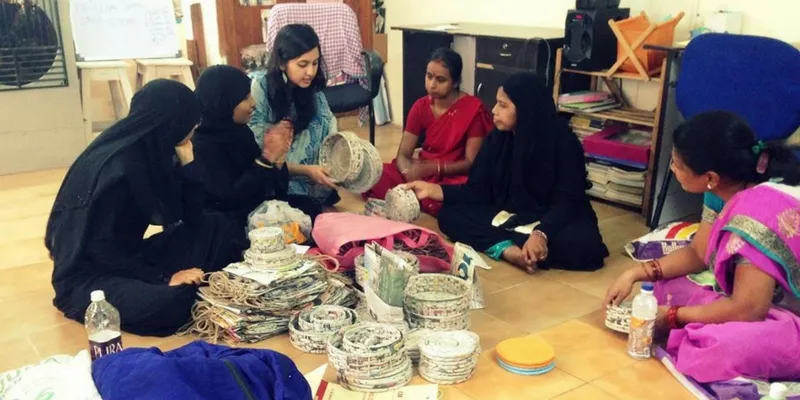
Three years back, 33-year-old Zabina (name changed) was a victim of domestic violence. Then, she lived with her husband would regularly beat her and her two children up. Belonging to a conservative family from the slums of Maktha in Hyderabad,
Zabina was not allowed to go out of her house, and financial constraints led her son to become a child labour.
Today, however, the tide has turned. Divorced from her husband, Zabina lives with her children and she earns her livelihood. “My self-confidence has increased and I am an independent woman. I have seen a vast change in the attitudes of my children towards me. They respect and trust me more than ever.”
Not only Zabina, but 30 other women several parts of Hyderabad who have joined Umeed have similar tales to tell. The non-governmental organisation was started by Gauri Mahendra and Udita Chadha in 2015 to promote women’s empowerment by providing training to them to create and sell simple eco-friendly newspaper handicrafts. The women were also given exposure to life-skills such as planning, budgeting, and teamwork.
Bread before books
Growing up in Lucknow, Gauri drew inspiration from her grandfather, an eye-surgeon, who conducted free camps for the needy in the villages of Uttar Pradesh. She studied human resources and knowledge management from Lancaster University, UK, and has experience working in both, the corporate as well as the non-profit sectors. Gauri also works as the CSR manager at Genpact.
Udita is a computer science graduate from Hansraj College, Delhi University, and worked in the corporate sector for over three years before starting Umeed. A strong believer in empowering women, she focused on creating platforms where women explore their identity and potential. Udita, however, left Umeed last year to pursue her masters in social work in the US.
Gauri and Udita met in 2013 while doing a two-year fellowship programme in Hyderabad where they taught underprivileged children at a government school in the Yousufguda slum.
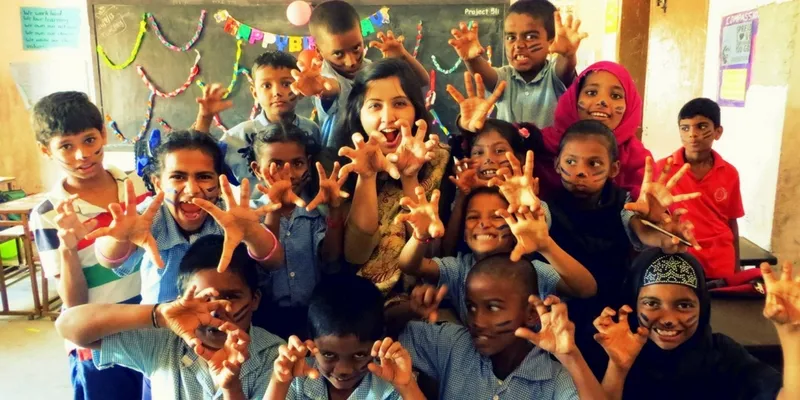
“Many of the students in my class who were regularly absentees were child workers. They had work to support their family and earn,” says Gauri.
The big realisation for her was that,
“Education was secondary for these children as they had to first fight for a meal”.
Gauri met these children’s mothers and saw many faced domestic issues. “Some of them wanted to work and make some money for the family, but their family didn't allow them to do so,” she says.
When Gauri spoke to Udita and other Teach for India fellows, the latter was keen to join Gauri to do something .
To begin with, Gauri and Udita spoke to their students’ mothers and asked them to join in after school hours. Initially, only five did.
Gauri says, “The husbands were apprehensive about sending the women out of the house to earn, they thought that we might brainwash their wives. Therefore, we asked the husbands to join us, and see what we were doing in the sessions.”
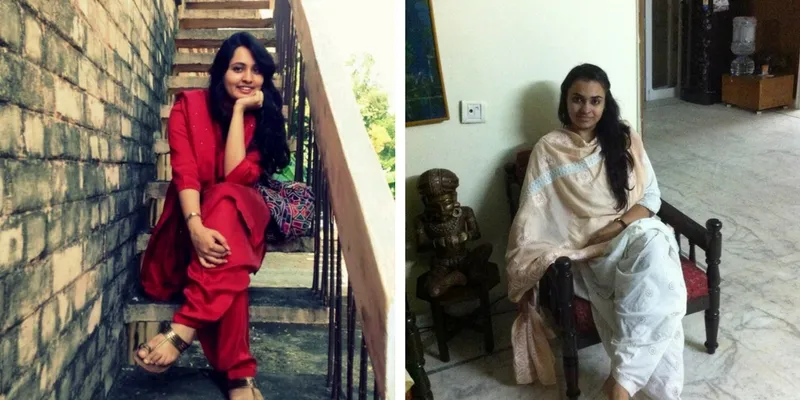
After a few classes, many understood the initiative will help their family, and that built trust for Umeed.
Ummed helped 38-year-old Munni Begum, a woman from Matka slum, gain confidence and help with the family income. Her husband works as an auto-driver, and earlier, her seven-year-old son had to work to earn for the family. Today, Munni proudly sends her child to school. “Earlier, my husband used to accompany me everywhere, I was not sure about handling the money and also about the bus route. After coming to Umeed, taking the bus route every day, I have gained an immense amount of confidence.”
A holistic development
“Umeed is not just a training facility, but a space for the holistic development of women working with us. These skills will go a long way to drive their confidence, empower them, and eventually, alter the oppressive mindsets around them to progressive ones. Therefore, providing a better life for their entire family,” says Gauri.
There are three aspects to Umeed - skill-training, value and mindset, and exposure.
When a woman joins Umeed, her first meeting with the organisation lasts four to five hours.
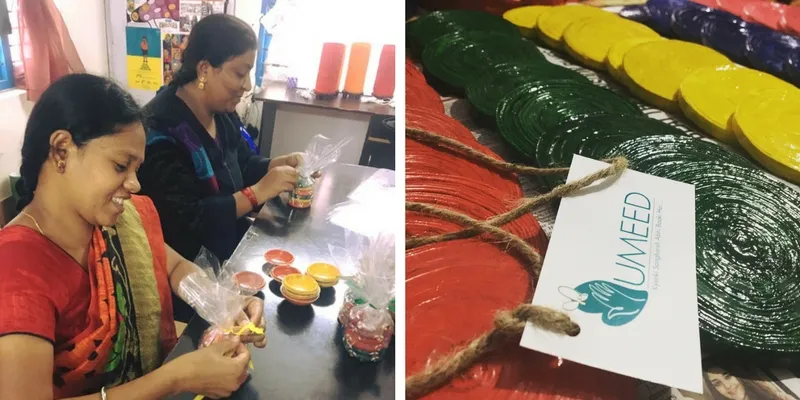
In the first two months of joining, she is given an orientation and is encouraged to share her difficulties. Gauri says,
“We first talk to them and build a relationship with them. It is not just about skilling and having them make products, we talk to them about simple values like dignity, self-respect, sustainability, environment, health, hygiene and general knowledge like what is an Aadhaar card.”
The women at Umeed make products like coasters, mats, lamps, curtains, as well as the seasonal item like diyas, and Christmas decorations.
The raw materials are provided by Umeed, and most are sustainable products like newspapers, clay, and thread. The women take work home and finish the work and bring it in over the weekend.
Says Gauri,
“In the initial stages, the women would ask us, ‘why can we do not something like stitching’, or ‘how will our products compete with a plastic product’, but we had to explain the need for sustainable living and recycling.”
Changing lives
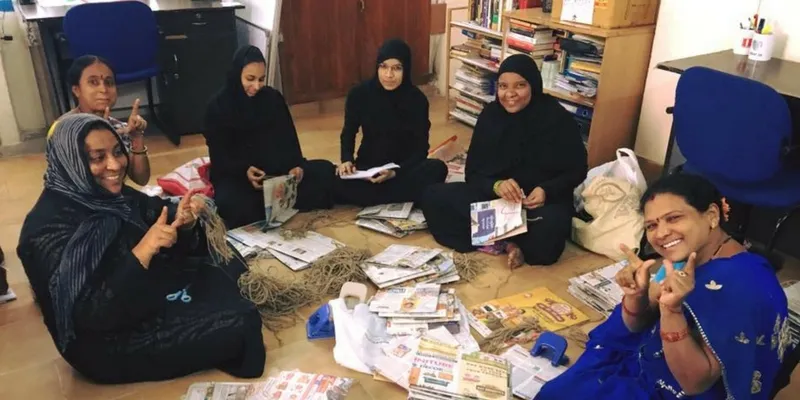
Each woman associated with Umeed gets a fixed salary, which can vary from Rs 1,500 to Rs 3,000, depending on the hours they spend making the products. The products cost from Rs 200 to Rs 1,200.
Umeed got an initial funding from Unlimited Hyderabad, a social incubator.






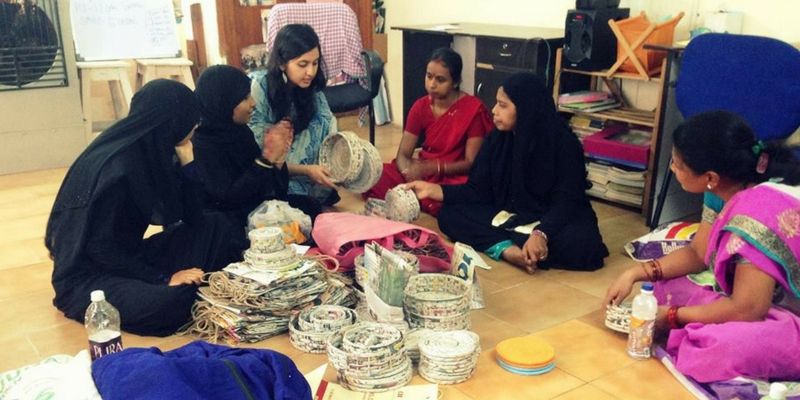



![[Funding alert] CityMall raises $11M in Series A round led by Accel Partners](https://images.yourstory.com/cs/2/220356402d6d11e9aa979329348d4c3e/citymall-founders-final-1616654283561.png)
![[Funding alert] Digital health startup Remedico raises Rs 4 Cr led by AWE Funds](https://images.yourstory.com/cs/2/b87effd06a6611e9ad333f8a4777438f/Imagee7rc-1612340735621.jpg)